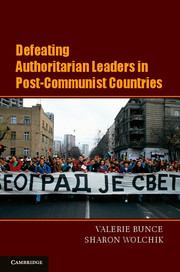Book contents
- Frontmatter
- Contents
- List of Figures and Tables
- Acknowledgments
- PART I THE PUZZLE
- PART II CASE STUDIES
- PART III COMPARATIVE ANALYSES
- 8 Explaining Divergent Electoral Outcomes
- 9 The Electoral Model
- 10 The Cross-National Diffusion of Democratizing Elections
- 11 After the Elections
- 12 Conclusions
- Appendix
- Index
10 - The Cross-National Diffusion of Democratizing Elections
Published online by Cambridge University Press: 05 June 2012
- Frontmatter
- Contents
- List of Figures and Tables
- Acknowledgments
- PART I THE PUZZLE
- PART II CASE STUDIES
- PART III COMPARATIVE ANALYSES
- 8 Explaining Divergent Electoral Outcomes
- 9 The Electoral Model
- 10 The Cross-National Diffusion of Democratizing Elections
- 11 After the Elections
- 12 Conclusions
- Appendix
- Index
Summary
My Croatian friends should look at the [Slovak] election and learn from our mistakes.
Vladimír MečiarDiffusion is the process whereby past events make future events more likely.
Pamela Oliver and David MeyersIn the previous two chapters, we presented three arguments. First, oppositions have won power in mixed regimes in postcommunist Europe and Eurasia when they and their allies have mounted innovative and sophisticated campaigns for political office. Second, the electoral model is vital to the success of the opposition, because it is very effective at getting citizens to vote, support the opposition, and, if necessary, defend their choices in the streets. Finally, this model did not originate in the postcommunist region. Its origins can be found, instead, in the United States, where it became standard operating procedure in national and state elections, and in the Philippines and Chile, where it played a key role in ending authoritarian rule during the second half of the 1980s.
The purpose of this chapter is to build on these arguments by switching our approach from one that treats the elections of interest in this book as separate events to one that analyzes them as related developments. We are interested, therefore, in the question of whether the cross-national diffusion of the electoral model explains why oppositions won or lost and why there were so many electoral turnovers in the postcommunist region in such a short period of time.
- Type
- Chapter
- Information
- Defeating Authoritarian Leaders in Postcommunist Countries , pp. 278 - 306Publisher: Cambridge University PressPrint publication year: 2011



